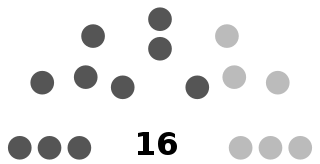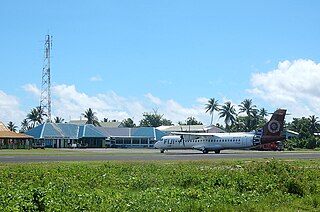
Tuvalu, formerly known as the Ellice Islands, is an island country in the Polynesian subregion of Oceania in the Pacific Ocean, about midway between Hawaii and Australia. It lies east-northeast of the Santa Cruz Islands, northeast of Vanuatu, southeast of Nauru, south of Kiribati, west of Tokelau, northwest of Samoa and Wallis and Futuna, and north of Fiji.

The current flag of Tuvalu was instated when the country became independent in 1978, after the separation from the Gilbert and Ellice Islands in 1976.

Tuvaluan, often called Tuvalu, is a Polynesian language closely related to the Ellicean group spoken in Tuvalu. It is more or less distantly related to all other Polynesian languages, such as Hawaiian, Māori, Tahitian, Samoan, Tokelauan and Tongan, and most closely related to the languages spoken on the Polynesian Outliers in Micronesia and Northern and Central Melanesia. Tuvaluan has borrowed considerably from Samoan, the language of Christian missionaries in the late 19th and early 20th centuries.

The domain name .tv is the Internet country code top-level domain (ccTLD) for Tuvalu.

The prime minister of Tuvalu is the country's head of government. According to Tuvalu's constitution, the prime minister must always be a member of the parliament and is elected by parliament in a secret ballot. Because there are no political parties in Tuvalu, any member of parliament can be nominated for the role.

The traditional music of Tuvalu consists of dances, including fatele, fakanau and fakaseasea. The influence of the Samoan missionaries sent to Tuvalu by the London Missionary Society from the 1860s resulted in the suppression of songs about the traditional religions or magic and many songs were lost. As the influence of the missionaries diminished in the 20th century the traditional dances were revived and the siva dance tradition from Samoa also became popular.

The Parliament of Tuvalu is the unicameral national legislature of Tuvalu. The place at which the parliament sits is called the Vaiaku maneapa. The maneapa on each island is an open meeting place where the chiefs and elders deliberate and make decisions.
The Congregational Christian Church of Tuvalu, commonly the Church of Tuvalu, is a Christian church which is the state church of Tuvalu, although this status merely entitles it to "the privilege of performing special services on major national events"; its adherents comprise about 86% of the 11,600 inhabitants of the archipelago.

The Tuvalu national football team is the international football team of Tuvalu. Football in Tuvalu is played at the club and international level. The Tuvalu national team draws players from the Tuvalu A-Division and trains at the Tuvalu Sports Ground at Funafuti. The national team competes in the Pacific Games, and is controlled by the Tuvalu Islands Football Association, which is an associate member of the Oceania Football Confederation (OFC) but not a member of FIFA.

The monarchy of Tuvalu is a system of government in which a hereditary monarch is the sovereign and head of state of Tuvalu. The current Tuvaluan monarch and head of state since 8 September 2022 is King Charles III. As sovereign, he is the personal embodiment of the Tuvaluan Crown. Although the person of the sovereign is equally shared with 14 other independent countries within the Commonwealth of Nations, each country's monarchy is separate and legally distinct. As a result, the current monarch is officially titled King of Tuvalu and, in this capacity, he and other members of the royal family undertake public and private functions domestically and abroad as representatives of the Tuvaluan state. However, the King is the only member of the royal family with any constitutional role.

Christianity is the predominant religion in Tuvalu, with Calvinism being the single largest denomination.

Funafuti is the capital of the island nation of Tuvalu. It has a population of 6,320 people, and so it has more people than the rest of Tuvalu combined, with approximately 60% of the population. It consists of a narrow sweep of land between 20 and 400 metres wide, encircling a large lagoon 18 km long and 14 km wide. The average depth of the Funafuti lagoon is about 20 fathoms. With a surface area of 275 square kilometres (106.2 sq mi), it is by far the largest lagoon in Tuvalu. The land area of the 33 islets around the atoll of Funafuti totals 2.4 square kilometres (0.9 sq mi); taken together, they constitute less than one percent of the total area of the atoll. Cargo ships can enter Funafuti's lagoon and dock at the port facilities on Fongafale.
Renewable energy in Tuvalu is a growing sector of the country's energy supply. Tuvalu has committed to sourcing 100% of its electricity from renewable energy. This is considered possible because of the small size of the population of Tuvalu and its abundant solar energy resources due to its tropical location. It is somewhat complicated because Tuvalu consists of nine inhabited islands. The Tuvalu National Energy Policy (TNEP) was formulated in 2009, and the Energy Strategic Action Plan defines and directs current and future energy developments so that Tuvalu can achieve the ambitious target of 100% renewable energy for power generation by 2020. The program is expected to cost 20 million US dollars and is supported by the e8, a group of 10 electric companies from G8 countries. The Government of Tuvalu worked with the e8 group to develop the Tuvalu Solar Power Project, which is a 40 kW grid-connected solar system that is intended to provide about 5% of Funafuti’s peak demand, and 3% of the Tuvalu Electricity Corporation's annual household consumption.

Tuvalu participates in the Olympic Games in the Summer Olympics. They have yet to compete at the Winter Olympics.

Enele Sosene Sopoaga PC is a Tuvaluan diplomat and politician who was Prime Minister of Tuvalu from 2013 to 2019.

The Tuvalu national rugby sevens team participates in the Rugby Sevens competitions at the Pacific Games and the Oceania Sevens Championship.

The governor-general of Tuvalu is the representative of the Tuvaluan monarch, currently King Charles III, in the country of Tuvalu.

Women in Tuvalu continue to maintain a traditional Polynesian culture within a predominantly Christian society. Tuvaluan cultural identity is sustained through an individual's connection to their home island. In the traditional community system in Tuvalu, each family has its own task, or salanga, to perform for the community. The skills of a family are passed on from parents to children. The women of Tuvalu participate in the traditional music of Tuvalu and in the creation of the art of Tuvalu including using cowrie and other shells in traditional handicrafts. There are opportunities of further education and paid employment with non-government organisations (NGOs) and government enterprises, education and health agencies being the primary opportunities for Tuvaluan women.
The COVID-19 pandemic in Tuvalu is part of the ongoing worldwide pandemic of coronavirus disease 2019 caused by severe acute respiratory syndrome coronavirus 2. The virus was confirmed to have reached Tuvalu on 20 May 2022. As of 31 August 2022, a total of 25,591 vaccine doses have been administered.










